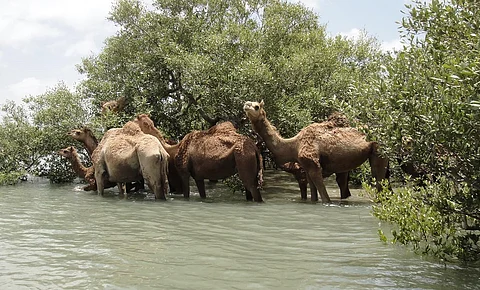

Kachchh in Gujarat is known for its rare indigenous breed of Kharai camel. But the existence of this species is under threat, despite multiple interventions by the National Green Tribunal (NGT).
The Kharai is known for its rare ability to swim long distances and graze on mangroves. But the rapid decline of this unique forest is now impacting one of India’s last remaining links to pastoral culture deeply associated with its ecology.
The NGT had issued directives in 2020 to the Gujarat forest department, Gujarat Coastal Zone Management Authority and revenue officials to jointly inspect the area and find out the persons responsible for obstruction of creeks and illegal expansion of salt pans used for salt manufacturing. The court demanded that action be taken in accordance with law. It also instructed the parties to ensure recovery of areas that suffered environmental damage and enumerate the cost of restoration for mangroves damaged.
However, no adequate steps have been taken so far in this regard. Kachchh district lost the highest amount of mangrove cover compared to 2021, according to the Indian State Forest Survey of India 2023. It recorded that -61.14 square kilometres of mangrove forest was lost in the district.
Despite clear orders from the NGT, the critical mangrove grazing areas continue to be threatened and lost due to illegal salt pan expansion and encroachment, according to Aashabhai, president of Kachchh Unt Ucherak Maldhari Sangathan (KUUMS), a community-based organisation in the region representing the case.
“Between 2018 and 2023, mangrove cover has shrunk from 4,084 hectares to just 1,312 hectares, while salt pans have aggressively expanded into Coastal Regulation Zone (CRZ)-I protected zones—from 13,681 to 17,918 hectares. Violations documented by both the Central Pollution Control Board-Gujarat Pollution Control Board’s joint inspection report and the Bhachau Deputy Collector’s site report (July 2023) include embankment of tidal creeks, uprooting of mangroves, use of bulldozers and fire to clear lands, and mass marine life deaths,” he said.
Aashabhai added that despite the NGT’s 2019 judgment ordering restoration and a stop to all activity in CRZ-I areas, the violations continued and further intensified.
The Deendayal Port Trust (DPT), which issued many of the salt leases in question, has failed to enforce safeguards. In December 2024, a second execution appeal was filed, pointing to blatant non-compliance, Aashabhai added.
Degradation of the habitat has directly impacted camel breeders, who traditionally belong to pastoral communities. Sustaining their herds and livelihoods is now a challenge.
Bhikabhai Rabari, president of the Kachchh Camel Breeders Association, said in a press statement that Kachchh’s camel breeders have been struggling for generations. On the other hand, camel herder communities like the Maldharis and salt farmers have synchronised themselves with the land’s rhythms.
Rabari said though the community does not own any land, they know every mangrove and creek best suited for camels to cool off, including the best migratory route for the animals.
The community representative said the mangroves that once stretched from Bhachau to Vondh and beyond, have gradually disappeared.
“Our camels are dying. The mangroves they feed on are gone due to uprooting of the trees. Every encroached creek means that their path is closed, and movement hindered. The government promised protection—we are still waiting,” he said.
The Kharai camel doesn’t thrive in pens or pastures but needs brackish water, tidal flows, and wild estuarine ecosystems, Aashabhai said.
He added that the mangroves act as crucial carbon sinks besides serving as a primary fodder source for the Kharai camel. They protect the coast against erosion and serve as safe breeding areas for aquatic life.
The NGT has scheduled a hearing regarding the same on July 9. It could be the final opportunity to save this habitat before it is lost, according to Aashabhai.
In the petition, the community members and representatives have demanded cancellation of illegal salt leases granted in CRZ-I areas, holding violators accountable.
They also demanded reopening of tidal creeks and restoration of mangroves with ecological aspects and recognising the Kharai camel and its pastoralists as ecological custodians.